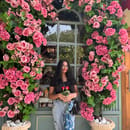Life is a series of choices, choices which lead to more choices and so on, and before you know it you end up in a life, you’re not quite sure you wanted. Like the roads in Frost’s famous poem, one path leads to another, taking you further into the woods, where more paths and choices await you.
“Between life and death there is a library, and within that library, the shelves go on forever. Every book provides a chance to try another life you could have lived. To see how things would be if you had made other choices. Would you have done anything different, if you had the chance to undo your regrets?”
The Midnight Library
Amidst all this, one cannot help but wonder about what could have been, the ‘what-ifs’, the chances not taken, the words left unspoken…as Taylor Swift said, “If one thing had been different, would everything be different?”
The Midnight Library tells the story of Nora Seed, who is disappointed with her life decisions and where they have taken her, and she decides to end it all on one fateful night. Instead of dying though, she ends up in The Midnight Library, that exists between life and death. In this library, the shelves go on forever and the possibilities are endless. Each book contains a life Nora could have lived if she’d made different choices.
“We only need to be one person.
We only need to feel one existence.
We don’t have to do everything in order to be everything, because we are already infinite. While we are alive we always contain a future of multifarious possibility.”
The Midnight Library
The librarian, Mrs. Elm, guides Nora through the library and helps her choose lives and books she would have liked to live in instead. Throughout these lives, Nora meets different versions of herself and other people she’d known in her original life, trying to find the perfect one to stick with.
Throughout her journey, Nora learns valuable lessons about the weight of choices and the impact they have on not only her life but also the lives of others. The novel encourages readers to consider the importance of self-compassion and to recognize that it’s never too late to change. As Nora embarks on her quest to find the life that feels perfect for her, she realizes that every life, no matter how seemingly perfect or flawed, comes with its own set of challenges, pain, and sacrifices. The notion of an ideal life is ultimately an illusion. True happiness, it turns out, is not found by seeking perfection, but by accepting life as it is and embracing the uncertainty and imperfection that come with it.
“And that sadness is intrinsically part of the fabric of happiness. You can’t have one without the other. Of course, they come in different degrees and quantities. But there is no life where you can be in a state of sheer happiness for ever. And imagining there is just breeds more unhappiness in the life you’re in.”
The Midnight Library
The Midnight Library is a poignant tale about life, what it means to be truly happy, the nature of reality, and that of choice
Nora’s journey is relatable, as it acknowledges the universal human experience of feeling stuck, questioning one’s life, and seeking meaning in a world that often feels random and unpredictable.
The book offers a fresh take on the theory of multiverses and parallel worlds, how multiple worlds exist just inches away from each other, yet we cannot perceive them.
“It is easy to mourn the lives we aren’t living. Easy to wish we’d developed other other talents, said yes to different offers. Easy to wish we’d worked harder, loved better, handled our finances more astutely, been more popular, stayed in the band, gone to Australia, said yes to the coffee or done more bloody yoga.
It takes no effort to miss the friends we didn’t make and the work we didn’t do the people we didn’t do and the people we didn’t marry and the children we didn’t have. It is not difficult to see yourself through the lens of other people, and to wish you were all the different kaleidoscopic versions of you they wanted you to be. It is easy to regret, and keep regretting, ad infinitum, until our time runs out.
But it is not lives we regret not living that are the real problem. It is the regret itself. It’s the regret that makes us shrivel and wither and feel like our own and other people’s worst enemy.
We can’t tell if any of those other versions would of been better or worse. Those lives are happening, it is true, but you are happening as well, and that is the happening we have to focus on.”
The Midnight Library
In the end, The Midnight Library is a meditation on the complexity of existence. It highlights that the key to contentment is not in longing for what could have been, but in accepting the present, forgiving oneself for past mistakes, and making the most of the life we have. The book invites readers to reflect on their own lives and how they might find peace with the choices they’ve made, ultimately leading to the realization that even if we could change everything, we might still be searching for the same sense of fulfillment.
Matt Haig’s exploration of these themes through the lens of a fantastical, metaphysical journey is a reminder that life is an ongoing experiment of learning, unlearning, and evolving. Through Nora’s eyes, we come to understand that the true essence of life isn’t about perfection or avoiding mistakes—it’s about embracing all the possibilities that exist, in our own lives and beyond, and choosing to move forward with hope, acceptance, and self-love.


